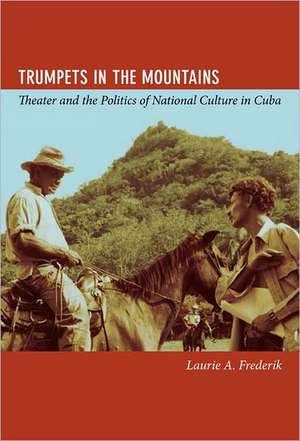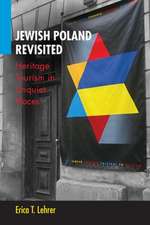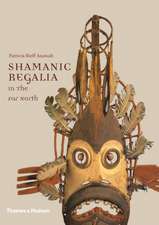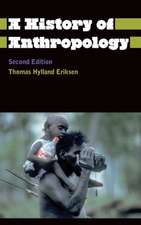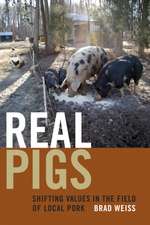Trumpets in the Mountains – Theater and the Politics of National Culture in Cuba
Autor Laurie Aleen Frederiken Limba Engleză Paperback – 2 sep 2012
Preț: 301.20 lei
Nou
Puncte Express: 452
Preț estimativ în valută:
57.64€ • 62.59$ • 48.42£
57.64€ • 62.59$ • 48.42£
Carte tipărită la comandă
Livrare economică 22 aprilie-06 mai
Preluare comenzi: 021 569.72.76
Specificații
ISBN-13: 9780822352655
ISBN-10: 0822352656
Pagini: 360
Ilustrații: 31 photographs, 3 maps
Dimensiuni: 150 x 250 x 15 mm
Greutate: 0.5 kg
Editura: MD – Duke University Press
ISBN-10: 0822352656
Pagini: 360
Ilustrații: 31 photographs, 3 maps
Dimensiuni: 150 x 250 x 15 mm
Greutate: 0.5 kg
Editura: MD – Duke University Press
Recenzii
"Trumpets in the Mountains is a journey into the rural heartland of Cuba, where few foreigners dare to go . . . and that includes Cubans who've never ventured beyond the city of Havana. Here is a portrait of a Cuba that has escaped the notice of the media, a world where theater people go to country towns and villages to engage in performative dialogues with farm workers about the meaning of the revolution. Drawing on years of fieldwork and personal participation in popular theater, Laurie A. Frederik shows how artistic creativity flourishes in everyday Cuban life in some of the most out of the way places, and offers rich ethnographic examples of how theater has become the perfect stage for acting out the hopes that Cubans still have of building a more just world. Written with sincere affection, this is one of those rare books that gives back to Cuba." Ruth Behar, author of An Island Called Home: Returning to Jewish Cuba"Engagingly written, theoretically astute, and based on extensive ethnographic work, Laurie A. Frederik's new book provides important insights into underexplored aspects of Cuban revolutionary culture. She considers the dynamics of socially engaged theater from the perspective of actors and audiences themselves and explores debates over national identity and the goals of the revolutionary project as negotiated far from the centers of state control. An important contribution." Robin Moore, author of Music in the Hispanic Caribbean: Experiencing Music, Expressing Culture
"Trumpets in the Mountains is a journey into the rural heartland of Cuba, where few foreigners dare to go ... and that includes Cubans who've never ventured beyond the city of Havana. Here is a portrait of a Cuba that has escaped the notice of the media, a world where theater people go to country towns and villages to engage in performative dialogues with farm workers about the meaning of the revolution. Drawing on years of fieldwork and personal participation in popular theater, Laurie A. Frederik shows how artistic creativity flourishes in everyday Cuban life in some of the most out of the way places, and offers rich ethnographic examples of how theater has become the perfect stage for acting out the hopes that Cubans still have of building a more just world. Written with sincere affection, this is one of those rare books that gives back to Cuba." Ruth Behar, author of An Island Called Home: Returning to Jewish Cuba "Engagingly written, theoretically astute, and based on extensive ethnographic work, Laurie A. Frederik's new book provides important insights into underexplored aspects of Cuban revolutionary culture. She considers the dynamics of socially engaged theater from the perspective of actors and audiences themselves and explores debates over national identity and the goals of the revolutionary project as negotiated far from the centers of state control. An important contribution." Robin Moore, author of Music in the Hispanic Caribbean: Experiencing Music, Expressing Culture
"Trumpets in the Mountains is a journey into the rural heartland of Cuba, where few foreigners dare to go ... and that includes Cubans who've never ventured beyond the city of Havana. Here is a portrait of a Cuba that has escaped the notice of the media, a world where theater people go to country towns and villages to engage in performative dialogues with farm workers about the meaning of the revolution. Drawing on years of fieldwork and personal participation in popular theater, Laurie A. Frederik shows how artistic creativity flourishes in everyday Cuban life in some of the most out of the way places, and offers rich ethnographic examples of how theater has become the perfect stage for acting out the hopes that Cubans still have of building a more just world. Written with sincere affection, this is one of those rare books that gives back to Cuba." Ruth Behar, author of An Island Called Home: Returning to Jewish Cuba "Engagingly written, theoretically astute, and based on extensive ethnographic work, Laurie A. Frederik's new book provides important insights into underexplored aspects of Cuban revolutionary culture. She considers the dynamics of socially engaged theater from the perspective of actors and audiences themselves and explores debates over national identity and the goals of the revolutionary project as negotiated far from the centers of state control. An important contribution." Robin Moore, author of Music in the Hispanic Caribbean: Experiencing Music, Expressing Culture
Notă biografică
Cuprins
List of Illustrations ix
Acknowledgments xi
Prologue: The Red Blood of Cuban Identity xix
Introduction: More than Just Scenery 1
1. Revolution and Revolutionary Performance or, what happens when el negrito, la mulata, and el gallego meet el Hombre Nuevo 41
2. Artists in the Special Period, Option Zero, and the Hombre Novísimo or, the heroic rescue of Liborio and Elpidio Valdés 76
3. Creative Process and Play-Making in Cumanayagua or, waiting for Atilio on the side of a country road 111
4. The Inundation of Siguanea and Cuba or, the near drowning and rescue of Cuba's Godot 142
5. Cultural Crusades and the Unsung Artists of Guantánamo or, how Don Quixote Saves humble Harriero from the devil 175
6. Storytellers and the Story Told: Voices and Visions in the Zones of Silence or, who wins the wager if the cockfight ends in a draw 218
7. Dramatic Irony and Janus-Faced Nationalism or, the triumphant stage return of el negrito and mister Smith 259
Notes 279
Glossary 291
Sources Cited 297
Index 325
Acknowledgments xi
Prologue: The Red Blood of Cuban Identity xix
Introduction: More than Just Scenery 1
1. Revolution and Revolutionary Performance or, what happens when el negrito, la mulata, and el gallego meet el Hombre Nuevo 41
2. Artists in the Special Period, Option Zero, and the Hombre Novísimo or, the heroic rescue of Liborio and Elpidio Valdés 76
3. Creative Process and Play-Making in Cumanayagua or, waiting for Atilio on the side of a country road 111
4. The Inundation of Siguanea and Cuba or, the near drowning and rescue of Cuba's Godot 142
5. Cultural Crusades and the Unsung Artists of Guantánamo or, how Don Quixote Saves humble Harriero from the devil 175
6. Storytellers and the Story Told: Voices and Visions in the Zones of Silence or, who wins the wager if the cockfight ends in a draw 218
7. Dramatic Irony and Janus-Faced Nationalism or, the triumphant stage return of el negrito and mister Smith 259
Notes 279
Glossary 291
Sources Cited 297
Index 325
Descriere
Provides an on-the-ground account of how visions of the nation are developed, manipulated, dramatized, and maintained in public consciousness
